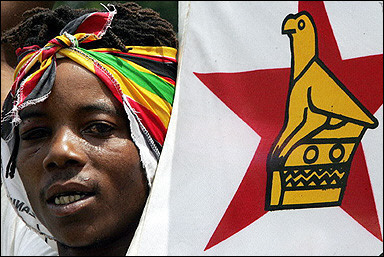
ZIMBABWE, possibly this coming month or sometime this year, will be holding harmonised elections.
Guest Column by Innocent Kurwa
In a country where the majority of people profess to be Christians of one denomination or another, there is a role that each one of us can play in this election.
There is no denying that since independence in 1980 there has always been some form of violence in our national elections.
Indeed, the ordinary person on a commuter omnibus to Magwegwe or Pumula suburb, Bulawayo, today believes that if there is no violence in an election, this is no election at all.
This explains the apprehension most of us have whenever an election is to be held.
This apprehension is shared by church leaders in the country, hence the call by various church leaders and politicians at all levels, including Vice-President Joice Mujuru, for churches to preach and campaign for peace in the forthcoming elections.
Among those that have been at the forefront of this campaign for peace is the Zimbabwe Catholic Bishops’ Conference. In their pastoral letter titled Zimbabwe Elections 2013 and the God of Second Chances, the Catholic bishops say this year’s elections are as important and critical in determining the destiny of the nation as the polls that ushered in independence in 1980.
- Chamisa under fire over US$120K donation
- Mavhunga puts DeMbare into Chibuku quarterfinals
- Pension funds bet on Cabora Bassa oilfields
- Councils defy govt fire tender directive
Keep Reading
“In 1980, the country closed the door to colonialism and opened another to independence. In 2013, the country needs to close the door to political intolerance, violence, impunity, lack of transparency and accountability, intimidation, corruption and open another to a true democratic dispensation in conducting free and fair elections that respect the will of the people and uphold human dignity,” the bishops urge in the pastoral letter.
A key aspect of a true democratic dispensation is acceptance — an acceptance that the next person has a right to hold a political view different from mine and has the right to exercise this political view as long as this is done without infringing on the political views and actions of another person.
Bringing a key issue of Pareto optimality, a key concept in welfare economics, what acceptance implies is that no one individual must enjoy a superior political welfare at the reduction of the political welfare of the next individual.
In biblical parlance, this is simply asking each one of us not to do unto another person what we would not like done unto us!
There is constant reference to the liberation struggle in the run-up to this year’s election.
This is not a new phenomenon; it is something that has always been pulled out of the bag in the past once there was some formidable challenge to one-party dominance in the country’s political sphere.
It is, however, not true that the liberation struggle was fought in order to make Zimbabwe a one-party State or a country where those with liberation credentials are the only chosen few who can run the country.
Indeed, the Catholic bishops highlight this in their pastoral letter.
“The ideals of the liberation war, of one person one vote and the yearning for freedom: Freedom from oppression, freedom from racism, freedom from human indignity and violation, freedom from poverty and hunger, ignorance and disease . . . were the driving force behind the fight for liberation.”
The challenge for us Zimbabweans today, especially Christians, is to be bold enough to proclaim the ideals of the liberation struggle and to preach peace.
If just three-quarters of Christians in Zimbabwe took up a firm and practical stand against political intolerance and openly campaigned against violence by refusing to perpetrate this heinous act, the level of violence during elections would drastically reduce if not eliminated, given the fact that virtually all Zimbabweans claim to be Christians.
In their pastoral letter, the Catholic bishops acknowledge the progress Zimbabwe made in the first 15 years after independence, but say these achievements have been overshadowed by developments thereafter.
“Zimbabwe made tremendous strides in almost all spheres of life. It was a country full of promise and indeed the envy of most of the countries in Africa south of the Sahara.
“Zimbabweans enjoyed a great sense of patriotism and earned a great deal of respect from their peers on the continent and the world at large. Yet in 2005, Zimbabwe celebrated its Silver Jubilee of independence under the throes of a crisis, which persists to this day.
“The patriotic fervour, national pride and the once lofty and romantic ideals of independence seemed to be lost . . . in the stark reality of a nation divided, traumatised and impoverished by this political, economic and social crisis.
“This has manifested itself in the denudation of professionals and skilled personnel through a massive brain drain into the Diaspora, decline in agricultural and manufacturing productivity, escalating corruption, flight of foreign investments, declared and undeclared sanctions and dwindling tourist arrivals. These negative indicators have inflicted a heavy toll on the generality of the population.”
The bishops hail the formation of the government of national unity and urge the country to build on this positive development by holding free and fair elections this year.
The call to all Christians at this crucial juncture is that each one of us must not only pray for peace and nonviolence in the forthcoming elections, but desist from participating in violence and must accept a fellow human being’s political views even if these are different and opposed to one’s views.










